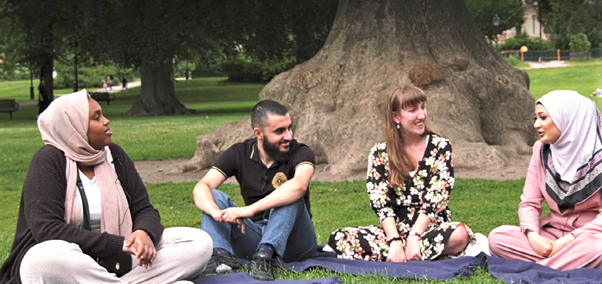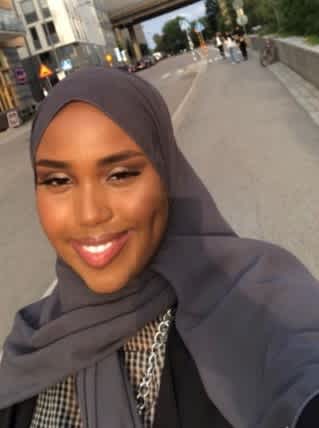
Young Peacebuilders’ Diaries: Maryan Mohamed
In 2021, Life & Peace Institute (LPI) coordinated a process where three youth from Sweden and four youth from Kenya were brought together to share experiences, challenges and learnings. The process started with a series of virtual conversations and culminated in an in-person meeting in Nairobi, Kenya, in November 2021.
The process resulted in a policy brief and a shorter video, capturing the wealth of experiences and learnings expressed by participants on topics related to Youth, Peace and Security (YPS) and peace more broadly.
In May 2022, Susanna Sebelius, LPI’s Peacefinders Programme Advisor, sat down with Maryan Mohamed, a young peacebuilder in Sweden, to discuss her thoughts on what she learnt about engaging young people in Sweden and Kenya.
This interview has been edited for clarity and brevity.
Who is Maryan Mohamed?

My name is Maryan Mohamed and I’m 21 years old. I’ve always had a passion for fighting injustice and I dream about someday becoming a social worker so that I can really reach those who are marginalized and at risk. On my way towards that, I’ve been active in different organizations and their projects where we’ve talked about women’s rights and talked a lot about the patriarchal structures and systems that exist in the world.
What have you learnt about the way in which Kenyan youth create change in their communities?
I have learnt that Sweden is a country that presents an image to the world that isn’t always accurate. The image presented is of a peaceful place without any problems. This image is not applicable to all of Sweden. I have learnt that there are similarities – both good and bad – between Sweden and Kenya, such as gang violence and socio-economic inequalities, despite Sweden being considered a “wealthier” country. In Kenya it felt like they [the Kenyan youth] almost had to get involved because they are directly impacted by the issues they speak of in their daily lives.
Do you see this as different to how youth in Sweden engage?
In Sweden it’s difficult to get involved and many young people don’t see the point in getting involved in issues they see as important. There isn’t space for us. I see how the resources available to young people in Sweden are limited by shutting down important places, such as youth recreational centres and other places where young people’s voices can be heard, and I think that this might impact their willingness to get involved. It could also be because young people in Sweden might not be as directly impacted by some of the issues they face, like the youth in Kenya.
Did you see any similarities in the challenges that Kenyan youth and Swedish youth face (based on your experience)?
Yes, Felix – one of the Kenyan youth – mentioned something that moved me. He mentioned how many of his childhood friends hadn’t finished school and had turned to drugs, with some even losing their lives because of it. Of course, there are similarities, as I am from a socioeconomically vulnerable area in Sweden, where young people are constantly being killed – but I’ve never lost a close friend while Felix has lost several.
What can youth in Sweden learn from Kenyan youth about creating change in their communities/making a difference?
So much. One problem I think that we have in Sweden is that we don’t celebrate youth and we don’t give them the space they need when it comes to important issues and decisions. There is a culture of silence that needs to disappear; we don’t always need to be humble – if you see there’s a need for change, do something about it! We need to communicate more with each other, because I think that’s how we can move forward. Sweden’s youth need to dare more and not be ashamed of things needing to change because we see things that older generations don’t see as clearly.
What are you doing to create change around the challenges you see in your community and/or Sweden more broadly?
I am always trying to get involved through participating in different associations and organizations where the issues I’m passionate about are worked on. Especially organizations where young people like myself are actually heard and where I feel like an important part.
Most recent blog posts
2026-01-13
Placing Local Voices at the Centre of Regional Peacekeeping ConversationsA Reflection from the Horn Dialogue Series IV